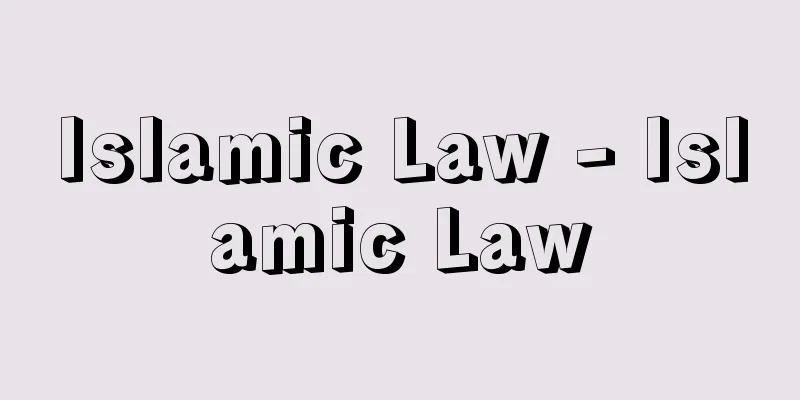Islamic Law - Islamic Law

|
In Arabic, it is called Shari'a. This word originally meant "the way to water". In the Qur'an, there are only four examples of the verb and noun forms of the root shr-' (Chapter 5, verse 48, Chapter 42, verses 12 and 21, Chapter 45, verse 18), but there, there is a "way" (shari'a) that humans should follow, and it is used as the truth that God has revealed and "decreed" (shara'a), not as human whims or speculations. Humans can attain salvation simply by accepting and submitting to it (this is the original meaning of the word "Islam"). Shari'a is nothing but a concrete expression of "the right way of life for humans". However, in Islam, it is known only by God's revelation, not by human reason or speculation. Justice in Islam means submitting to God and being obedient to Him. [Nakamura Hirojiro] The Content and Nature of Shari'ahIf humans must think and act correctly at all times and in all circumstances, God's justice must apply, at least in concept, to all areas of human life. In fact, Sharia is a sacred law that specifically regulates not only the "religious" life of each Muslim, but also his "earthly" life. Its contents include "ritual norms" (ibadat) on purification, repentance, prayer, charity, fasting, pilgrimage, funerals, etc., as well as "legal norms" (mu'amarat) covering both public and private law, such as marriage, divorce, parent-child relationships, inheritance, slavery and free persons, contracts, buying and selling, oaths and testimonies, waqf (donated property), lawsuits and trials, the rights and obligations of non-Muslims, crimes and punishments, and war. As such, Sharia is not limited to special people, but is a norm that applies equally to all members of the community, in principle, except for minors. The Islamic community (ummah) is the earthly expression of the ideals of Sharia. Thus, Sharia is essentially a moral obligation that believers must follow, but it often contains positive legal content. And in order to maintain order in the real community, it needed to be enforced as positive law. Islam's orientation towards politics stems from the positive legal character of Sharia and its comprehensiveness. Incidentally, among the standards of the Quran that form the basis of Sharia, those relating to rituals and personal life are specific and detailed, leaving little room for interpretation. However, in other areas, they merely state general principles and basic principles, and are lacking in specificity. For this reason, the practical application of Sharia in these areas is interpreted in various ways in response to changes in the environment and social interests, and is by no means uniform. As a result, in reality, it was mainly the family law aspect that was in operation. [Nakamura Hirojiro] Source of LawSharia is considered to be absolute and unchanging as a concrete and systematic expression of God's command (the Quran), but on the other hand, it is historical as it is interpreted by humans. It took nearly two centuries for Sharia to be established in its classical form and for the classical theory of legal interpretation to be perfected by Shafi'i (767-820). According to this theory, the four main sources of Islamic law are the Quran, Sunnah (the example of the Prophet), Ijma (the agreement of the community), and Qiyas (analogy). These are four procedures for legal interpretation to seek God's will. In other words, it goes without saying that the first place to rely on when judging the good and bad of any action is the Quran. If there is no provision in the explicit text of the Quran, or if the explicit text of the Quran is ambiguous or general, the Sunnah is to be relied upon. This is the "example" of the Prophet as shown in the Hadith (traditions handed down as the words and deeds of the Prophet). If no norm can be found in the Sunnah, then Ijma is to be relied upon. This refers to the "consensus" of jurists (mujtahids) who represent the community and are skilled in legal interpretation. If no applicable norm can be found in ijma, one relies on qiyas. This is "analogy" based on the judgments given in the Quran and Sunnah when a problem similar to the case at hand is found. The above four are called "sources of law." [Nakamura Hirojiro] The Establishment of the Four Schools of LawIslamic law is a code of conduct for all aspects of human life, derived from these sources. However, there is room for various interpretations of each of these four sources. For example, when it comes to the Sunnah, the conclusions differ depending on the level to which the hadith, which are ranked in terms of their authenticity, are adopted. Similarly, when it comes to the Qiyas, the conclusions differ depending on what is used as the basis for inference. Furthermore, the more Sunnah is used, the less room there is for Qiyas. Regardless of the basic points, differences in conclusions were reached on the details, which gave rise to various schools of law. Today, the Hanafi School founded by Abu Hanifa, the Maliki School founded by Malik ibn Anas, the Shafi'i School founded by Shafi'i, and the Hanbali School founded by Ahmad ibn Hanbal remain as officially recognized schools of law in the Sunni sect. Shiites also have a separate school of law (the Ja'fari school) from Sunnis. [Nakamura Hirojiro] The current status and operation of Islamic lawThe judges who apply Islamic law are called qadis. They are appointed and dismissed by the government, and they hear and rule according to the legal provisions of their own school of thought. When they are faced with a major case or a new problem that is difficult to resolve, they seek a judgment (fatwa) from an authority on legal interpretation called a mufti. As modern legal reforms have introduced new legal codes in many Islamic countries, the size of Sharia courts has been reduced and the activities of qadis have been restricted. [Nakamura Hirojiro] "Introduction to Islamic Law" by Tomine Shiro (1964, Kinokuniya Shoten) [References] | | | |Source: Shogakukan Encyclopedia Nipponica About Encyclopedia Nipponica Information | Legend |
|
アラビア語でシャリーアSharī‘aという。この語は元来「水場に至る道」を意味した。コーランには、語根shr-‘の動詞、名詞形をあわせて4例(5章48節、42章12節・21節、45章18節)しかないが、そこでは人間には従うべき「道」(シャリーア)があり、それは人間の思い付きや思惑ではなく、神が啓示し「定めた」(シャラアshara‘a)真理として用いられている。人間はただそれを受け入れ、それに服従すること(これが「イスラム」の語の本来の意味)によって救いに至るのである。シャリーアとは「人間の正しい生き方」の具体的表現にほかならない。ただイスラム教では、それは人間の理性や思惑ではなく、神の啓示によってのみ知られるとされる。イスラム教における正義とは、神に服従し、神に従順であることを意味する。 [中村廣治郎] シャリーアの内容と特質人間はいかなるとき、いかなる場合でも正しく考え、正しく行動しなければならないとすれば、神の正義は、少なくとも理念的には、人間生活の全分野に妥当するものでなければならない。事実、シャリーアは個々のムスリム(イスラム教徒)の「宗教的」生活のみならず、「現世的」生活をも具体的に規制する聖法である。その内容は、浄(きよ)め、懺悔(ざんげ)、礼拝、喜捨(きしゃ)、断食(だんじき)、巡礼、葬儀などに関する「儀礼的規範」(イバーダート)から、婚姻・離婚・親子関係、相続、奴隷・自由人、契約、売買、誓言・証言、ワクフ(寄進財産)、訴訟・裁判、非ムスリムの権利・義務、犯罪・刑罰、戦争などの公私両法にわたる「法的規範」(ムアーマラート)をも含む。そのようなものとしてのシャリーアは、特殊な人に限定されるのではなく、未成年者などを除いて原則として共同体の成員すべてに等しく適用される規範である。イスラム共同体(ウンマ)とは、このシャリーアの理念の地上的表現として意味をもつ。このようにシャリーアは、本質的には信仰者の当然従うべきものとしての道徳的義務であるが、そこには実定法的内容のものが多い。そして現実の共同体の秩序維持のために、それは実定法として強制される必要があった。イスラムの政治への志向は、シャリーアのこの実定法的性格とその包括性に由来する。 ところで、このシャリーアの基本となるコーランの規範のうち、儀礼や個人生活に関する部分は具体的かつ詳細であり、解釈の余地はあまりない。しかし、それ以外の分野では一般的原則や基本原理を述べるにとどまり、具体性に乏しい。それだけにこの部分に関するシャリーアの実際的適用は環境や社会的利益の変化に応じてさまざまに解釈され、けっして一律ではない。したがって、現実に機能していたのは家族法的側面が主であった。 [中村廣治郎] 法源シャリーアは神の命令(コーラン)の具体的体系的表現として絶対不変とされるが、他方では人間が解釈したものとして歴史的である。シャリーアが古典的な形で成立し、法解釈の古典理論がシャーフィイー(767―820)によって大成されるまでには2世紀近い年月を要した。この理論によれば、イスラム法の主要法源としてコーラン、スンナ(預言者の範例)、イジュマー(共同体の合意)、キヤース(類推)の四つが定められた。これは神の意志を探る法解釈の手続を四つ述べたものである。すなわち、あらゆる行為に対する善悪の判断において、まずよりどころにすべきはコーランであることはいうまでもない。もしコーランの明文に規定がない場合、またはコーランの明文があいまいであったり、一般的であったりする場合には、スンナに依(よ)る。これはハディース(預言者の言行として伝えられる伝承)に示された預言者の「範例」である。もしスンナにも規範をみいだせない場合には、イジュマーに依る。これは共同体を代表し、法解釈に堪能な法学者(ムジュタヒド)の「合意」をさす。もしイジュマーにも該当する規範をみいだせない場合には、キヤースに依る。これは、コーランやスンナのなかに当面の事件に類似の問題をみいだし、それに対して示されている判断からする「類推」のことである。以上の四つが「法源」とよばれる。 [中村廣治郎] 四法学派の成立イスラム法とは、これらの法源から演繹(えんえき)された人間の生活全般にわたる行為規範である。とはいえ、これら四つの法源のおのおのについて、さまざまな解釈の余地が残されている。たとえば、スンナについてみても、信憑(しんぴょう)性においてさまざまにランク分けされているハディースをどのランクまで採用するかで結論は違ってくる。同様にキヤースについてみても、何を類推の基本にするかで出てくる結論が異なる。また、スンナを多用すれば、それだけキヤースを用いる余地は少なくなる。基本的な点はともかく、細部の点についてはこうして結論の違いが生まれ、それがさまざまな法学派を生んだ。今日ではアブー・ハニーファを祖とするハナフィー学派、マーリク・イブン・アナスを祖とするマーリキー学派、シャーフィイーを祖とするシャーフィイー学派、アフマド・イブン・ハンバルを祖とするハンバリー学派の四法学派がいずれもスンニー派の公認学派として残っている。シーア派にもスンニー派とは別の法学派(ジャーファリー派)がある。 [中村廣治郎] イスラム法の運用と現状イスラム法を具体的に適用するのは、カーディーとよばれる裁判官である。彼らは政府によって任免され、自己の学派の法規定に従って審理し判決を下す。彼らが解決困難な大きな事件や新しい問題に直面した場合には、ムフティーとよばれる法解釈の権威に判断(ファトワー)を求める。近代の法改革によって多くのイスラム諸国で新しい法典が導入されてくると、シャリーア裁判所は縮小され、カーディーの活動も制限されてきた。 [中村廣治郎] 『遠峰四郎著『イスラム法入門』(1964・紀伊國屋書店)』 [参照項目] | | | |出典 小学館 日本大百科全書(ニッポニカ)日本大百科全書(ニッポニカ)について 情報 | 凡例 |
<<: Islamic Calendar - Islamic Calendar
Recommend
Masuhiro Ozeki
1838 * - 1868 * A daimyo from the end of the Edo ...
Secchi - Pietro Angelo Secchi
Italian astronomer. He joined the Society of Jesu...
Doris people - Doris people
A branch of the ancient Greek people. Also known a...
Horse Chestnut - Maronie (English spelling) marronier French
A deciduous tall tree of the family Aesculaceae (...
Island Arc - Touko
An archipelago that forms an archipelago like a bo...
Arthurian Legend
The story of King Arthur and his Knights of the R...
CFA Franc - CFA Franc
A unit of common currency used mainly in French-sp...
Cuevas
…In Spain, these types of dwellings are called ca...
Hunyadi (English spelling)
[Born] 1407? Hunyad, Transylvania [Died] August 11...
Ammonite suture - Ammonite suture
…The Permian and Triassic periods show ceratitic ...
Ortygia
…She corresponds to Latona in Roman mythology. Sh...
One Hundred Verses - Hyakuin
A form of linked verse (renga) and haikai (haikai...
Estrada Doctrine
A declaration issued by Mexican Foreign Minister G...
Ins, TH - Ins
...Eisenstein, Lang, Renoir, Dreyer, Hitchcock an...
Nucleoprotein
A general term for complexes of nucleic acids and...









